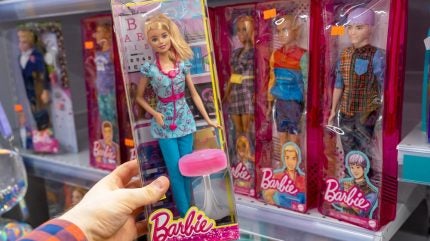
Mattel, the US-based toy manufacturer behind Barbie and Hot Wheels, has withdrawn its annual financial forecast for 2025, citing uncertainties stemming from new tariffs imposed by President Donald Trump on imports from China and other Asian countries.
The company has indicated that it may raise prices on some products in the US market to offset increased costs resulting from these tariffs.

Discover B2B Marketing That Performs
Combine business intelligence and editorial excellence to reach engaged professionals across 36 leading media platforms.
Tariffs prompt strategic adjustments
The Trump administration recently introduced a 10% tariff on all imports from China, where Mattel sources just under 40% of its products.
This move has disrupted global supply chains and increased input costs for the toy industry. In response, Mattel is considering price increases and has announced plans to cut back on promotions and discounts in the US market.
The company is also accelerating efforts to diversify its manufacturing footprint, aiming to reduce reliance on Chinese production.
Financial performance amid challenges
Despite the challenging environment, Mattel reported first-quarter net sales of $827 million, surpassing analyst expectations.

US Tariffs are shifting - will you react or anticipate?
Don’t let policy changes catch you off guard. Stay proactive with real-time data and expert analysis.
By GlobalDataHowever, the company posted a net loss of $40 million for the quarter, attributed to rising expenses linked to the tariffs. Mattel has increased its cost-savings target for the year to $80 million, up from the previous goal of $60 million.
The company also repurchased $160 million in shares during the first quarter, maintaining its $600 million share buyback plan for 2025.
Industry-wide implications
The toy industry is grappling with the broader impact of the tariffs, which have raised concerns about higher consumer prices and potential product shortages, especially during the crucial holiday season.
Mattel’s CEO, Ynon Kreiz, has expressed support for the Toy Association’s advocacy of zero tariffs on toys, highlighting the industry’s challenges in maintaining affordable pricing for consumers.
Competitor Hasbro has also acknowledged the potential impact of the tariffs but has maintained its financial forecasts, citing strong performance in its gaming segment.
As the trade tensions continue, Mattel and other toy manufacturers are navigating a complex landscape, balancing cost management strategies with efforts to minimize the impact on consumers.
Navigate the shifting tariff landscape with real-time data and market-leading analysis. Request a free demo for GlobalData’s Strategic Intelligence here.





